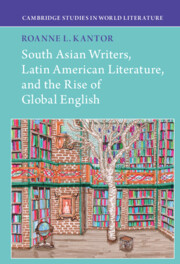Book contents
- South Asian Writers, Latin American Literature, and the Rise of Global English
- Cambridge Studies in World Literature
- South Asian Writers, Latin American Literature, and the Rise of Global English
- Copyright page
- Dedication
- Contents
- Figures
- Acknowledgments
- Introduction
- Chapter 1 Transmigrant
- Chapter 2 Stranger
- Chapter 3 Displacee
- Chapter 4 Pilgrim
- Chapter 5 Revenant
- Epilogue
- Notes
- References
- Index
Chapter 4 - Pilgrim
Journeys to the Roots of Magical Realism
Published online by Cambridge University Press: 17 February 2022
- South Asian Writers, Latin American Literature, and the Rise of Global English
- Cambridge Studies in World Literature
- South Asian Writers, Latin American Literature, and the Rise of Global English
- Copyright page
- Dedication
- Contents
- Figures
- Acknowledgments
- Introduction
- Chapter 1 Transmigrant
- Chapter 2 Stranger
- Chapter 3 Displacee
- Chapter 4 Pilgrim
- Chapter 5 Revenant
- Epilogue
- Notes
- References
- Index
Summary
This chapter considers the “globalization” of magical realism in the 1980s and its relationship to the consolidation of postcolonial literary studies in the same moment. Even as Latin America was being progressively marginalized in favor of taxonomic accounts of magical realism as a signature postcolonial style, Salman Rushdie and other South Asian authors became “pilgrims.” They use textual journeys to Latin America to declare the centrality of that tradition to their own forays into literary magic. Through references to Alejo Carpentier, Gabriel García Márquez, and others, Rushdie and Zulfikar Ghose pose Latin America as a funhouse mirror that reflects back a hyperbolically distorted but ultimately referential image of postcolonial political life. Ghose is joined by Anita Desai in his approach to Latin America as a concave mirror, one that allows inverting the implied political meaning of institutional affiliation in “America” by redirecting their attachment southward. Finally, Sunny Singh interrogates the postcolonial critical desire for magical realism to act as a transparent window onto traditions of home, framing it instead as a looking glass – both opposite and identical.
Keywords
- Type
- Chapter
- Information
- Publisher: Cambridge University PressPrint publication year: 2022

